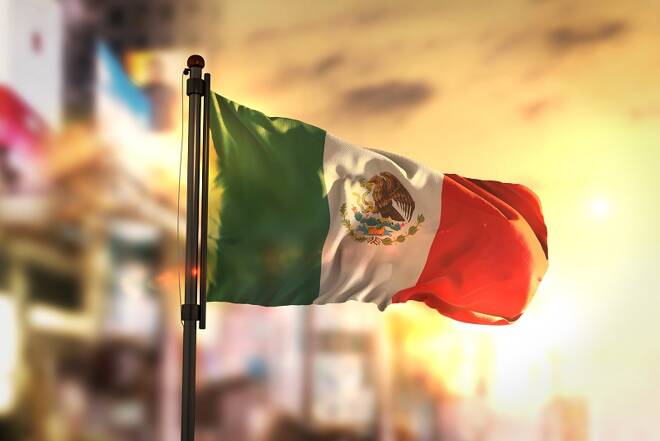Advertisement
Advertisement
Mexico – The Year of Political Shocks Rolls On
By:
Mexico voted on Sunday and the polls going into Sunday’s vote were not wrong. The current vote count shows that a majority 53% voted for Obrador’s left-wing Monero. Can Obrador make a real change in Mexico?
Few may have known the significance of Trump’s shock Presidential victory back in late 2016, with geopolitical risk has been more associated with South and Central America and the Middle East than in the West, where the Establishment had reigned supreme for so many years.
Since Trump’s 2016 election victory, we’ve seen the rise of populist, anti-establishment governments across Europe gather pace, with voters thinking, well, if the U.S can do it, so can we.
While France, Spain, The Netherlands, and Austria came close to a changing of the guard, Britain voted to leave the EU, Germany saw Merkel’s power materially reduce and Italy bring in a populist coalition government that is certainly going to ruffle some feathers in Brussels and, let’s not forget the bullied and now relatively silent Syriza in Greece, who to be fair did eventually manage to deliver on that much talked about debt relief.
As Trump goes about his business, forcing heads’ of states into submission over everything and everything, voters have perhaps become quite mindful of the need to have a head of state than can, not only protect their own rights, but also show the ability to stand up against the Establishment of old and now, the U.S President.
Obrador – The Mexican Trump?
Mexico voted on Sunday and the polls going into Sunday’s vote were not wrong. That’s not surprising when considering how far ahead front-runner Obrador, more commonly referred to as AMLO’s and his National Regeneration Movement (Monero) stood to go into Sunday’s polls.
The current vote count shows that a majority 53% voted for Obrador’s left-wing Monero, leaving the rest in the dust, PAN coming in a distant second, with just 22.5% of the vote and PRI an even more distant third, with 16.4% of the vote. For the incumbent PRI party that’s some fall from grace and it wasn’t much better for the PAN party who had been in power from 2000 to 2012.
Why AMLO?
Well, plain and simple. Crime and corruption in Mexico has left the country in the hands of the cartels and the cartels certainly let their political views be known, with over 130 political figures, including candidates for various Mexican states, being murdered execution style since the beginning of the election campaign last September.
Obrador has been compared with many; the more pessimistic comparing him to Chavez and even Trump, while others have compared him to the likes of Bernie Sanders.
Whether he will become the Chavez of Mexico remains to be seen, but should he deliver on even half of his election promises, it can only be a good thing for voters and the country, as he promises to increase minimum wages without hitting voters with higher taxes, while wanting to stamp out crime and corruption to deliver economic prosperity to the needy.
While hand to mouth is certainly the main incentive for voters, stamping out corruption and violence is also a key step in bringing a better standard of living to the Mexican people.
Talks of the Mexican Wall have only increased the negative sentiment towards Mexico and the Peso, so how Obrador handles Trump and what will likely be his first test in battle, NAFTA, will be key from a global financial market perspective and the direction of the Peso and Mexico’s Bolsa.
Suggesting possible amnesty to the King Pins of the Cartels may provide him with the hope of longevity as a Mexican President looking to clamp out corruption and crime, but delivering to the poor and on NAFTA will be what voters will be looking for most, NAFTA having driven Mexico into more of a cheap labour camp than what should have been a prosperous time for the people of the world’s 15th largest and Latin America’s 2nd largest economy.
It’s ultimately the fact that Mexico has the 2nd highest degree of economic disparity between the rich and the poor amongst OECD nations and ranked 160th globally with a Gini Index of 48.2% that has led to the surge in crime and Obrador’s resounding victory.
A Gini Index of 0% reflects perfect equality, while 100% reflects maximum equality. South Africa had the highest Gini Index at 63.4%, with Brazil having the highest from Latin America at 51.3%.
The Mexican Peso took a tumble as the markets opened on Monday in response to the AMLO’s victory and, with AMLO’s Monero considered to be a left-wing, nationalist party that is anti-capitalism, there are interesting times ahead for Mexico and the Peso, with the final tally on votes yet to come on, though as things stand, it’s looking like AMLO will have his way largely unopposed, with projections giving AMLO more than 60% of the seats in the lower house and close to 55% of the Senate, controlling both houses of Congress a must to deliver the promise of change and with it an even more volatile Peso near-term.
About the Author
Bob Masonauthor
With over 28 years of experience in the financial industry, Bob has worked with various global rating agencies and multinational banks. Currently he is covering currencies, commodities, alternative asset classes and global equities, focusing mostly on European and Asian markets.
Advertisement
